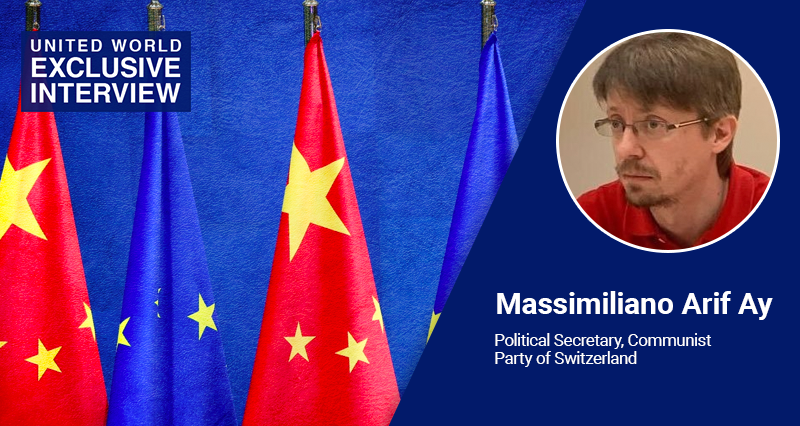A delegation of the Communist Party of Switzerland visited China in mid-May. The delegation led by Massimiliano Arif Ay, General Secretary of the Party, met and exchanged views with many Chinese individuals, organizations and institutions. The party also had talks with its Chinese counterpart, the Communist Party of China.
Massimiliano Arif Ay answered our questions about the visit.
What topics did you address with the leaders of the Chinese Communist Party?
The delegation that I had the honor to lead included, in addition to the Communist Party of Switzerland, delegates from three other Italian parties, and it was a trip to get to know China in all its complexity: We visited important urban centers such as Beijing and Nanjing, but also peripheral villages with an agricultural vocation such as Bijie, where poverty was widespread until a few years ago. We were thus able to see concretely the scientific intervention of the Chinese authorities not only to develop productive forces but also to redistribute wealth. There were also visits to industries aiming at ecologically sustainable development, cultural centers and universities as well as district Party headquarters because one of the focuses of our trip was precisely to study the organization of the Chinese Communists in the suburbs but also their grassroots work with young people.
We had the privilege of discussing openly with officials at various levels: in Beijing, for example, we met the vice-minister of international relations of the Central Committee of the Communist Party of China and in Guiyang we visited the vice-governor of Guizhou province. With the first interlocutor we explained that the Swiss bourgeoisie is divided and that the comprador faction is winning, but that our Party will fight hard for neutrality and to keep us out of NATO.
With the second interlocutor, however, we basically discussed two topics: firstly, a comparison of institutional activity on the municipal level in the two countries and concrete hypotheses for cultural town-twinning with Swiss cities and forms of commercial and tourist cooperation, emphasizing the importance of involving small companies as well and not only big brands.
Also very fruitful was the meeting with the Chinese Academy of Social Sciences with which we envisaged forms of research in the area of the renewal of Western Marxism, on which as the Communist Party of Switzerland we have developed important expertise.
Do you have any observations about the Chinese society and administration that you would like to share with us?
Let us start by saying that the idea of some left-wing parties in Europe that China has abandoned the socialist path and turned into a capitalist country is totally wrong. What emerges in every sphere of Chinese society is the strong and structured presence of the Communist Party of China as a vanguard organization directing every aspect of the country’s economic life as well, including the private sectors. Particularly impressive is the degree of capillarity of the Party’s grassroots organizations.
Another significant fact is the strong link between patriotism, the defense of national sovereignty also in the cultural and economic sphere and not only in the military sphere, and internationalism, which is expressed by the concept of a ‘human community with a shared destiny’ that also thanks to the New Silk Road is contributing greatly to the development of the world’s poorest countries.
We attended a lecture by a professor from the Party’s cadre school who insisted that the welfare of workers is the priority and that ‘we cannot leave anyone to their fate, neither because of age, sex nor ethnicity’. With this in mind, they are, for example, working hard to improve the right to education, increasing the years of compulsory schooling and increasing scholarships for the children of poorer peasant families.
The New Silk Road as a means to “emancipate from neo-colonialism”
There are some fears and suspicions in Europe about “becoming dependent on China” and that “China is becoming an expansionist/imperialist country”. How do you evaluate these?
This is nonsense! China has an attitude of absolute regard for the sovereignty of all nations, respects their peculiarities and social and economic systems, and does not export its own model. By the way, even from a Marxist-Leninist point of view, it is wrong to consider China an imperialist country since this country has not reached any capitalist hegemonic stage, but remains anchored to a socialist perspective.
Rather, Europe is dependent on the US-led Atlantic market and until it breaks free from this yoke, it cannot play any progressive role in the future multipolar world. I would then add that as I said, the New Silk Road is not expansionism but precisely the most concrete way for the peoples oppressed by imperialism to emancipate themselves from neo-colonialism, to gain their independence not only in words but also in deeds, i.e. through economic development. There is no socialism in fact without a productive revolution, which by the way you in Türkiye have also rightly identified.
Europe “must emancipate itself from diktats of Washington”
There is the widespread idea that Europe is stuck in the middle between Russia and China on one side and the US on the other. What position should Europe take today and in the future?
It is obvious that with NATO’s expansionism towards the East since 1991, with the Color Revolutions in Eastern Europe, with the fascist coup d’état in Ukraine in 2014, and with the bombing of Russian civilians in the Donbass over the past 9 years, the US wanted to bring war back to Europe, so as to prevent Europe from opening up too much to Eurasia and the emerging countries and instead remain tied to the Atlantic market.
Europe, to avoid further impoverishment, must instead emancipate itself from the diktats of Washington, which represents a declining power that wants to drag us into a world war. The same applies to my country: we Swiss communists propose that Switzerland, in order to ensure its own independence, since it cannot be self-sufficient due to a lack of raw materials, should at least diversify its trading partners more and open up to emerging countries. In this sense – against the opinion of the Swiss social democratic and ecologist left – we openly support the free trade agreement between Switzerland and China, but at the same time we push for greater food and energy sovereignty for the country.
Path to socialism on “a dialectical relation with the market as China teaches”
China’s economic success is widely acknowledged. How do you evaluate this success as a communist party? From a class and historical point of view, do you think that a similar model and practice as in China can be applied in your country and in Europe?
During one of the meetings with Chinese officials, I said that for the Communist Party of Switzerland, socialism has nothing to do with a system of equality in poverty. This truly insane idea is unfortunately widespread in a part of the left and also in some European Communist parties: the primary accumulation of capital and the development of the productive forces are actually essential elements of Marxist analysis that should be rediscovered. Undoubtedly, therefore, a future transition to socialism in Switzerland will not be able to do without a dialectical relationship with the market as China teaches, but the mistake should not be made of mechanically importing the Chinese model into a European country with very different cultures.
I would like to say that in China, despite the economic reforms over the past 40 years, there are still five-year plans and the role of the state is strong. It directs economic development in a planned and rational way, in the collective interest of the nation and not of individual profits. Private entrepreneurs operating in the market must submit to the guidelines set by the state, which in turn is controlled by the Communist Party. In every company, alongside the managers, there is always a political counterpart who answers to the Party, so that even private efforts are always compatible with the broader strategies of collective development. Nothing to do, in short, with voracious, exploitative Western capitalism imbued with liberal individualism. We find the same situation in universities, where next to the rector in charge of teaching, there is also the political secretary of the university party cell that controls the ideological direction.








Leave a Reply